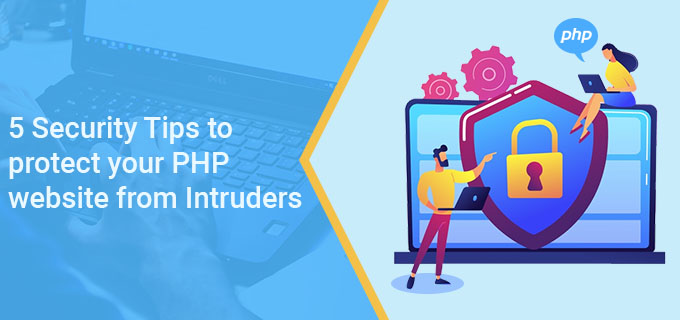By Antonio Moore
Introduction
Since PHP is widely used and popular, PHP security is crucial and the number of vulnerable PHP applications is large. PHP is as secure as any other programming language. According to research, it helps to power more than 70% of the global web applications by making it one of the most commonly used programming languages in the world. Many PHP web apps share parts of scripts with other web applications. If the shared piece of code is found to be vulnerable, all the web applications that are using it, also become vulnerable.
Over these years, PHP has been pretty much in demand. Well, one of the obvious reasons could be by using such tech one can do everything thought was possible. Also, the fact that the platform can never go wrong especially the latest PHP version 7.4.
Launching your website is like unlocking the door to your premises with your office. You will be surprised to know that PHP development is one of the most debated topics in the development community and keeping in check all the core objectives of the project. So, in this article, we’re going to discuss the most important development part of PHP development, which is security. Yes, you heard it right! Today, we’ll learn the tips to protect your PHP website from hackers and web attackers. Let’s get started!
Top 5 Security Tips to protect your PHP website from Intruders
Tip #1. Cross-site Scripting (XSS)
The first practice that you should follow to protect your PHP website is Cross-site scripting. Yes, it is one of the most dangerous external attacks performed by injecting malicious JavaScript code into your website. This infected code the cores of your web app, as the intruders can inject any type of client-side code into your existing application code without even giving you a hint. There are higher chances of attacking a site that admits and submits user input.
During an XSS attack, the hackers replace the original code of your website that works as an actual code disrupting the performance of your site and often stealing the data. The intruders bypass the access control of your website, history, uploaded files, specific directory structure, URL parameters, enable cookies, and other vital functions.
Tip #2. Use HTTPS Protocols
As a consumer, you may look for the green lock image and HTTPS in your browser tab every time you enter some sensitive information into a website. The five letters seen in the browser bar are an important shorthand for hacker security and it represents that it is safe to provide financial information on that webpage.
SSL certificates are essential because it helps to secure the transfer of information such as contact information, credit cards, and more between your website and the server. The SSL certificate is important for every eCommerce website, having one has recently become essential for all websites.
Nowadays, search engines are taking web application security more seriously than ever because they want potential users and a safe experience browsing the web.
Tip #3. Keep software and website platform updated
This may look like preposterous advice but it is important to update your software daily for security reasons. It deserves a mention here. Make sure that you are using the latest version of operating systems, plugins, content management systems, and software to keep your website secure from web attackers. Outdated software is more vulnerable to security threats and hacking activities.
A reputed managed hosting service keeps itself secure by updating the software and using the latest version of the operating system. If your PHP development company is using a managed hosting solution then you’re not required to worry so much about applying security updates for the OS because the hosting service provider should take care of this.
Tip #4. Prevent SQL Injection Attacks
As we all know, one of the key components of an application is the database. It is mostly targeted by web attackers and intruders via an SQL injection attack. This attack uses particular UPL parameters to access the database and perform illegal activities such as modifying data, altering fields, queries, and deleting the entire application database.
To overcome such challenges, it is recommended to use parameterized queries to properly substitute the arguments before executing the SQL query. By following such practices, helps to secure your queries but make sure that it also makes them structured for efficient processing.
Tip #5. Use Security Tools
In the end, when you are finally done with everything to enhance your website security by following the above-mentioned tips, it is time to test your website security. Web developers use a variety of quality tools for this. Security tools mimic the hacking activities for the security mechanism of the website.
Here is the list of some free testing tools that you should use to secure your PHP website:
Netsparker: It is a great tool for testing XSS attacks and SQL injection which is available for free.
SecurityHeaders.io: It can be used for configuration checks for your website.
Xenotix XSS Exploit Framework: It is a specialized tool that prevents XSS attacks.
OpenVAS: You can use the OpenVAS testing tool which offers various advanced features and functionalities that help you to secure your PHP website.
Make sure that you are not entirely dependent on automated testing as automated tests sometimes fail to detect all the security vulnerabilities presented in your website. You should focus on solving critical security queries as they can lead to hacking events.
Wrapping Up
Hey Readers, we hope you find this article useful and you’ll follow the essential tips that we discussed here.
Are you planning to develop secure PHP web applications? If so, then gain access from the top-notch PHP development company which follows the PHP security tips to develop a secure entire site for their clients and create an app according to your requirements.
Do you think we missed out on any important practice to list down for great security? Then, we would love to hear from you, just mention it in the comment section given below.
Antonio Moore is a full time blogger and technical consultant. He is a Geek and tech enthusiast. He loves to write blogs on trendy technical topics. You can find his bylines on many famous websites. When he is not working you will find him going for a trio somewhere.
Follow Brilliance Security Magazine on Twitter and LinkedIn to ensure you receive alerts for the most up-to-date security and cybersecurity news and information.



